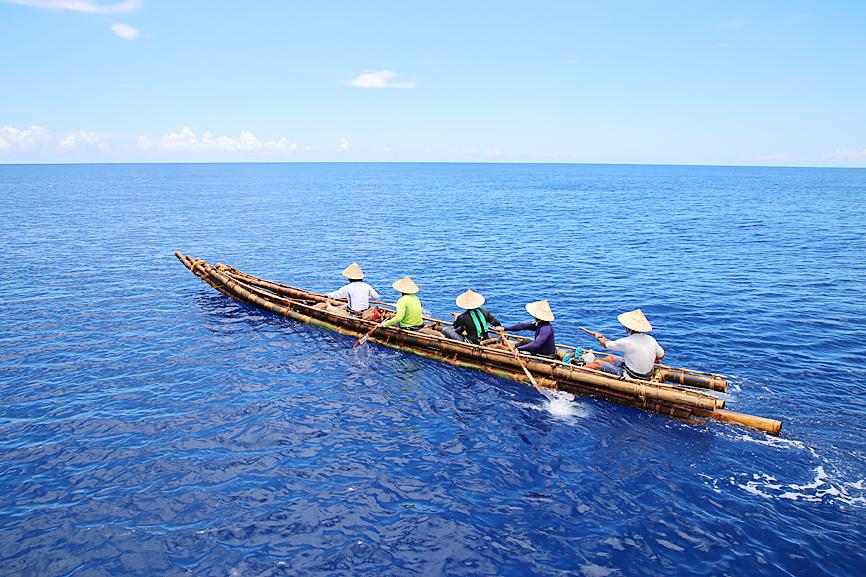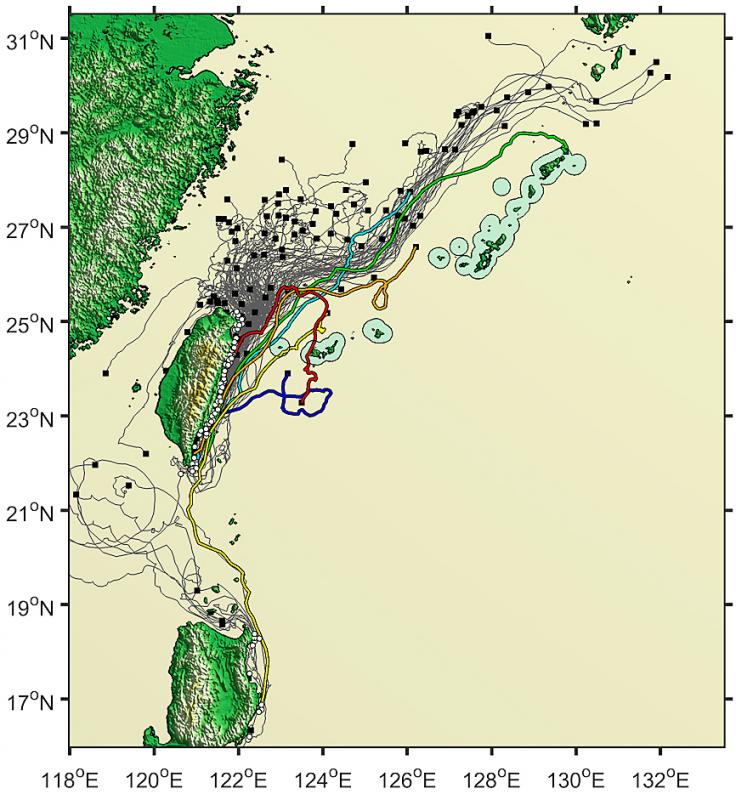About 30,000 years ago, ancient inhabitants of Taiwan might have intentionally crossed the Kuroshio, one of the world’s strongest currents, researchers found.
They might have searched for a new habitat and reached the Ryukyu Islands in Japan, said a study, titled “Palaeolithic voyage for invisible islands beyond the horizon,” which was published in the journal Scientific Reports on Thursday.
The study, led by anthropologist Yousuke Kaifu, a ancient history researcher at the University of Tokyo, is part of a project on maritime migration of Paleolithic people 35,000 to 30,000 years ago.

Photo courtesy of University of Tokyo professor Yousuke Kaifu
While some of them are believed to have migrated from Taiwan to the Ryukyu Islands, it has been unclear whether their voyages were made by chance or choice.
“I had been seeking a good way to demonstrate the intentionality of the sea crossings, but had no idea what to do. Then, I ... came across the idea of using the tracking buoys,” Kaifu wrote in an e-mail to the Taipei Times.
Kaifu, with the help of Jan Sen (詹森), a professor at National Taiwan University’s Institute of Oceanography, and former technician Kuo Tien-hsia (郭天俠), analyzed data of the movements of 138 satellite-tracked buoys that drifted past the Philippines, Taiwan and Japan from 1989 to 2017.

Photo courtesy of former National Taiwan University technician Kuo Tien-hsia
The methodology was predicated on some evidence showing that the Kuroshio’s flow remained unchanged over the past 100,000 years, the team said.
Of the 122 buoys that drifted past Taiwan, 114 were carried northward by the Kuroshio, and of these, only three came within 20km of the central and southern Ryukyu Islands, the researchers found.
This usually happened under severe weather conditions, such as typhoons and northeasterly monsoons, they found.
Of the 16 buoys that drifted past the Philippine main island of Luzon, only one drifted toward the Ryukyu Islands, they found.
The ancient sailors could not have reached the Ryukyu Islands through random drifting, whereas bad weather conditions, although occasionally bringing some buoys closer to the islands, are unlikely to have been used by the ancient seafarers, Jan said.
Yonaguni Island, the westernmost of the Ryukyu Islands, is in good weather conditions visible from some mountains in eastern Taiwan, he added.
The movements of the buoys, originally deployed by the US-led Surface Velocity Program, show the possible routes of ancient voyages, Jan said, adding that their method can be described as “mining old data for a new application.”
Asked if there were conditions unfavorable for survival in Taiwan that prompted the Paleolithic people to move, Kaifu said that if there were such conditions, people might have sought to relocate within Taiwan.
“You really do not have to go to that remote island, but they did,” Kaifu said. “I think that is human nature.”
“It must be a one-way trip. The Kuroshio current is too strong to come back, even if they plan a round trip,” he added.
In July last year, a team of five paddled from Taitung to Yonaguni Island in a logboat, covering the 225km in 45 hours.
Kaifu said he seeks to document the research in further academic papers, books and films, including a short film that would be screened in Tokyo this month.
Asked if the migration from Taiwan was the first known sea crossing to Japan, Kaifu said that ancient populations also crossed the sea from the Korean Peninsula, adding that the first residents of the Ryukyu Islands were not necessarily the ancestors of modern Japanese.
“This project is to highlight a part of interesting human histories, not to applaud someone. I do not want to be nationalistic in my anthropological studies,” he said.

The Grand Hotel Taipei on Saturday confirmed that its information system had been illegally accessed and expressed its deepest apologies for the concern it has caused its customers, adding that the issue is being investigated by the Ministry of Justice Investigation Bureau. The hotel said that on Tuesday last week, it had discovered an external illegal intrusion into its information system. An initial digital forensic investigation confirmed that parts of the system had been accessed, it said, adding that the possibility that some customer data were stolen and leaked could not be ruled out. The actual scope and content of the affected data

‘LIKE-MINDED PARTNER’: Tako van Popta said it would be inappropriate to delay signing the deal with Taiwan because of China, adding he would promote the issue Canadian senators have stressed Taiwan’s importance for international trade and expressed enthusiasm for ensuring the Taiwan-Canada trade cooperation framework agreement is implemented this year. Representative to Canada Harry Tseng (曾厚仁) in an interview with the Central News Agency (CNA) said he was increasingly uneasy about Ottawa’s delays in signing the agreement, especially as Ottawa has warmed toward Beijing. There are “no negotiations left. Not only [is it] initialed, we have three versions of the text ready: English, French and Mandarin,” Tseng said. “That tells you how close we are to the final signature.” Tseng said that he hoped Canadian Prime Minister Mark Carney

POSITIVE DEVELOPMENT: Japan and the US are expected to hold in-depth discussions on Taiwan-related issues during the meeting next month, Japanese sources said The holding of a Japan-US leaders’ meeting ahead of US President Donald Trump’s visit to China is positive news for Taiwan, former Japan-Taiwan Exchange Association representative Hiroyasu Izumi said yesterday. After the Liberal Democratic Party’s landslide victory in Japan’s House of Representatives election, Japanese Prime Minister Sanae Takaichi is scheduled to visit the US next month, where she is to meet with Trump ahead of the US president’s planned visit to China from March 31 to April 2 for a meeting with Chinese President Xi Jinping (習近平). Japan and the US are expected to hold in-depth discussions on Taiwan-related issues during the

President William Lai (賴清德) yesterday bestowed one of Taiwan’s highest honors on Saint Vincent and the Grenadines (SVG) Ambassador Andrea Clare Bowman in recognition of her contributions to bilateral ties. “By conferring the Order of Brilliant Star with Grand Cordon on Ambassador Bowman today, I want to sincerely thank her, on behalf of the Taiwanese people, for her outstanding contribution to deepening diplomatic ties between Taiwan and SVG,” Lai said at a ceremony held at the Presidential Office in Taipei. He noted that Bowman became SVG’s first ambassador to Taiwan in 2019 and